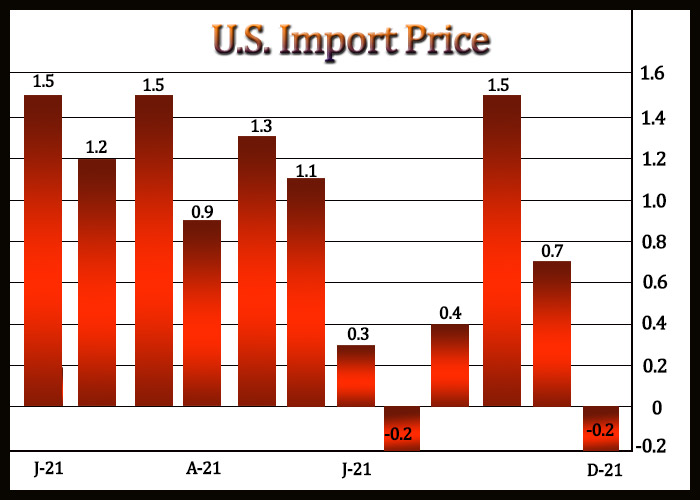Import prices in the U.S. unexpectedly showed a modest decrease in the month of December, according to a report released by the Labor Department on Friday.
The Labor Department said import prices edged down by 0.2 percent in December after climbing by 0.7 percent in November. The dip surprised economists, who had expected import prices to rise by 0.3 percent.
The unexpected drop in import prices reflected a sharp pullback in prices for fuel imports, which plunged by 6.5 percent in December after jumping by 2.3 percent.
Excluding fuel, import prices increased 0.5 percent for the third consecutive month in December, reflecting higher prices for non-fuel industrial supplies and materials, consumer goods, foods, feeds, and beverages, automotive vehicles, and capital goods.
With import prices showing the first monthly decrease since August, the annual rate of import price growth slowed to 10.4 percent in December from a ten-year high of 11.7 percent in November.
“We expect elevated energy prices to underpin persistent and sticky inflation readings in Q1, while renewed supply disruptions from the Omicron variant risk reaggravating import price pressures,” said Mahir Rasheed, U.S. Economist at Oxford Economics.
He added, “However, import prices should begin to unwind in Q2 with energy prices moderating and domestic demand cooling as the Fed pivots to tightening monetary policy.”
The report also unexpectedly showed a steep drop in export prices, which plunged by 1.8 percent in December after increasing by a downwardly revised 0.8 percent in November.
Economists had expected export prices to surge by 1.1 percent compared to the 1.0 percent jump originally reported for the previous month.
The unexpected nosedive in export prices came as prices for non-agricultural exports plummeted by 2.1 percent in December after rising by 0.6 percent in November.
Prices for non-agricultural exports showed the steepest drop since April 2020, as lower prices for non-agricultural industrial supplies and materials and non-agricultural food more than offset higher prices for capital goods and consumer goods.
Meanwhile, the report said prices for agricultural exports increased by 0.8 percent in December after jumping by 1.1 percent in November.
The Labor Department said higher prices for soybeans, fruit, cotton, dairy products and corn more than offset lower prices for nuts and meat.
Compared to the same month a year ago, export prices in December were up by 14.7 percent, reflecting a slowdown from the 18.2 percent spike in November.
Source: Read Full Article
